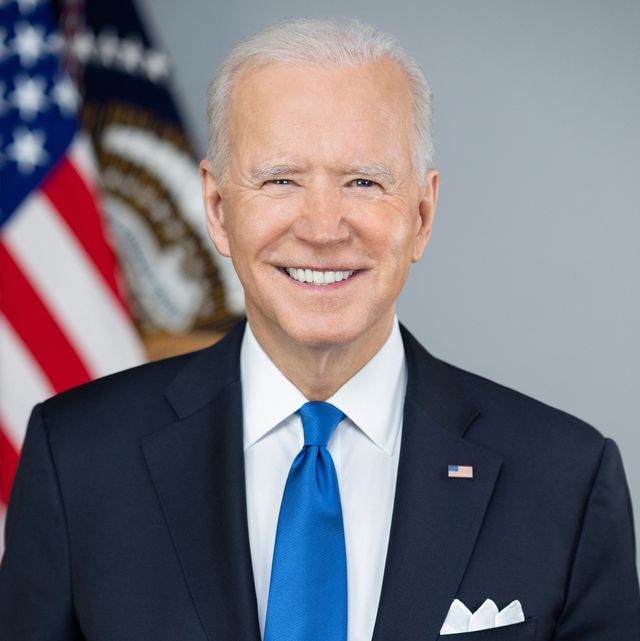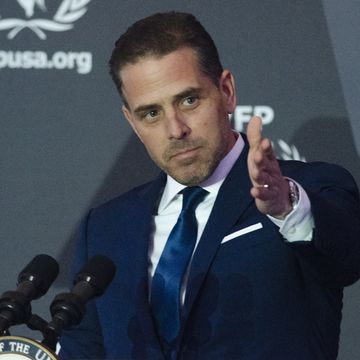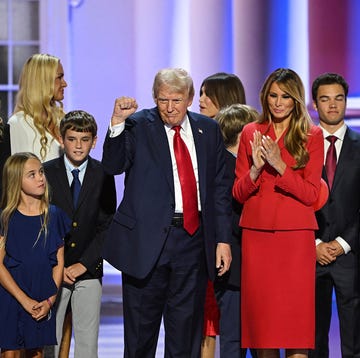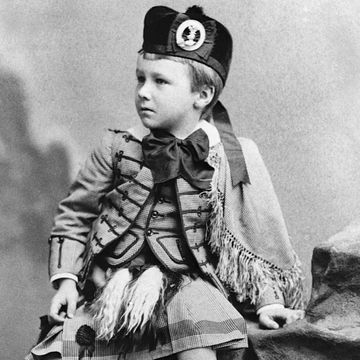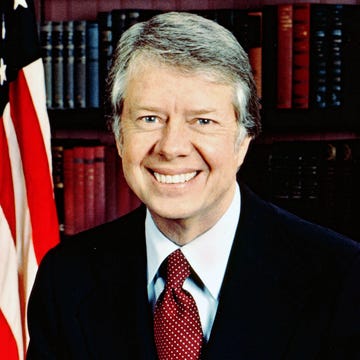1942–present
Joe Biden News: Former President Diagnosed with Prostate Cancer
Former U.S. President Joe Biden has released his first public statement regarding his diagnosis with an “more aggressive” form of prostate cancer. In a May 19 post on X (formerly Twitter), the 82-year-old shared a photo of him and his wife, Jill Biden, and acknowledged his recently disclosed health battle.
“Cancer touches us all. Like so many of you, Jill and I have learned that we are strongest in the broken places. Thank you for lifting us up with love and support,” the post read.
It comes one day after Biden’s office announced the 46th president, who had been experiencing urinary symptoms, was diagnosed with prostate cancer that has metastasized to the bone. His cancer has a Gleason score of 9, which suggests it’s aggressive and more likely to advance and spread. However, the cancer appears to be hormone-sensitive, which “allows for effective management.” Biden and his family are reviewing treatment options with doctors.
The diagnosis comes amid increased discussion over Biden’s health during his presidential term, which ended in January. A new book by CNN’s Jake Tapper and Axios’ Alex Thompson suggests that Biden showed signs of physical and mental decline while in office.
Who Is Joe Biden?
Joe Biden is a longtime Democratic politician who served as the 46th president of the United States, from 2021 to 2025. His journey to the nation’s highest office began with his first election in 1970; the one-time attorney became the sixth youngest U.S. senator in history and eventually Delaware’s longest-serving senator. Beginning in 2009, Biden served two terms as the 47th vice president of the United States as part of President Barack Obama’s administration. Biden’s third presidential campaign led to his election in 2020. Faced with increasing public scrutiny during his reelection effort four years later, Biden withdrew his bid and completed his single-term presidency.
Quick Facts
FULL NAME: Joseph Robinette Biden Jr.
BORN: November 20, 1942
BIRTHPLACE: Scranton, Pennsylvania
SPOUSES: Neilia Hunter Biden (1966–1972) and Jill Biden (1977–present)
CHILDREN: Beau, Hunter, Naomi “Amy,” and Ashley
ASTROLOGICAL SIGN: Scorpio
Young Joe Biden
Long before reaching one of the highest political offices in the nation, Joseph Robinette Biden Jr., born on November 20, 1942, spent his early years in the blue-collar city of Scranton in northeast Pennsylvania. His father, Joseph Biden Sr., worked cleaning furnaces and as a used car salesman. His mother was Catherine Eugenia “Jean” Finnegan.
Biden credits his parents with instilling in him toughness, hard work, and perseverance. He has recalled his father frequently saying, “Champ, the measure of a man is not how often he is knocked down, but how quickly he gets up.” He’s also said that when he would come home sullen because he had been bullied by one of the bigger kids in the neighborhood, his mother would tell him, “Bloody their nose so you can walk down the street the next day!”
One reason he was bullied was his stutter. “Other kids looked at me like I was stupid. They laughed,” Biden wrote in his 2007 memoir Promises to Keep. “I wanted so badly to prove I was like everybody else.” They also mocked him with unkind nicknames like “Dash” and “Joe Impedimenta.” Early attempts at speech therapy when Biden was in kindergarten didn’t help, but he eventually overcame his stutter by memorizing long passages of poetry and reciting them out loud in front of the mirror.
Education
Biden and his younger siblings—Valerie, James, and Frank—were raised Catholic, and the future politician attended Catholic schools through high school. In Scranton, he studied at St. Paul’s Elementary School. In 1953, the year Biden turned 11, the family moved to Claymont, Delaware, a rapidly growing middle-class community outside Wilmington that was sustained primarily by the nearby DuPont chemical company.
Biden attended the St. Helena School until he gained acceptance into the prestigious Archmere Academy. Although he had to work by washing school windows and weeding the gardens to help his family afford tuition, Biden had long dreamed of attending the private college preparatory school, which he called “the object of my deepest desire, my Oz.” At Archmere, Biden was a solid student and, despite his small size, a standout receiver on the football team. “He was a skinny kid,” his coach remembered, “but he was one of the best pass receivers I had in 16 years as a coach.” Biden graduated high school in 1961.
Next, he enrolled at nearby University of Delaware, where he studied history and political science and played football. Biden would later admit that he spent his first two years of college far more interested in football, girls, and parties than academics. But he also developed a sharp interest in politics during these years, spurred in part by the inauguration of fellow Catholic John F. Kennedy in 1961.
His relationship with his future wife Neilia Hunter, which began in 1964, prompted him to apply himself more fully to his studies. His diligence earned him acceptance into Syracuse University Law School upon his college graduation in 1965.
Biden was, at best, a mediocre law student. During his first year at Syracuse, he flunked a class for failing to properly cite a reference to a law review article. Although he claimed it was an accidental oversight, the incident would haunt him later in his career. Still, it didn’t stop him from graduating with his juris doctor in 1968.
Marriages and Early Political Career
On a spring break trip to the Bahamas during his junior year of college, Biden met a Syracuse University student named Neilia Hunter and, in his own words, “fell ass over tin cup in love—at first sight.” Biden and Hunter married two years later on August 27, 1966.
After Biden graduated law school, the couple moved to Wilmington, Delaware, where he began practicing at a law firm. He also became an active member of the Democratic Party, and in 1970, he was elected to the New Castle County Council. While serving as councilman, in 1971, Biden started his own law firm.
In addition to his increasingly busy professional life, Biden and Neilia had welcomed three children: Beau, born in 1969; Hunter, born in 1970; and Naomi, born in 1971 and who went by the nickname “Amy.” “Everything was happening faster than I expected,” Biden said about his life at the time.
In 1972, the Delaware Democratic Party encouraged the 29-year-old councilman to run against the popular Republican incumbent J. Caleb Boggs for the United States Senate. Although few thought he stood any chance, Biden ran a tireless campaign organized mostly by family members. His sister, Valerie Biden Owens, served as his campaign manager, and both of his parents campaigned daily. That November, in a tight race with a large turnout, Biden won an upset victory.
Just as all of Biden’s wildest dreams seemed to be coming true, he was struck by devastating tragedy. A week before Christmas in 1972, Neilia and the couple’s three children were involved in a terrible car accident while out shopping for a Christmas tree. The accident killed his wife and daughter and severely injured his sons. Biden was inconsolable and even considered suicide. He recalls, “I began to understand how despair led people to just cash in; how suicide wasn’t just an option but a rational option... I felt God had played a horrible trick on me, and I was angry.”
Nevertheless, at the encouragement of his family, the widower decided to honor his commitment to representing the people of Delaware in the Senate. He skipped the swearing-in ceremony for new senators in Washington D.C. and instead took the oath of office from his sons’ hospital room. In order to spend as much time as possible with his sons, Biden decided to continue to live in Wilmington, commuting to and from Washington each day by Amtrak train, a practice he maintained through his entire long tenure in the Senate.
For several years, Biden was focused on raising his two young boys and his political career. But in the spring of 1975, his brother Frank suggested he ask Jill Jacobs, a recently divorced 24-year-old college senior, out on a date. She already had plans, but he convinced her to change them. Their relationship grew from there. After five proposals, Jill finally agreed to marry Biden. Their wedding was held June 17, 1977.
Jill became a devoted stepmother to Beau and Hunter. In 1981, she had the couple’s daughter, Ashley. The Bidens remain married today.
Editor’s Note: If you or someone you know is struggling with suicidal thoughts or self-harming behaviors, call or text 988 to get help from the 988 Suicide & Crisis Lifeline.
Senate Years
From 1973 to 2009, Biden served a distinguished career as a U.S. Senator for Delaware. His successful first campaign in 1972 made him the sixth youngest U.S. senator elected in the nation’s history.
During his tenure, he won respect as one of the body’s leading foreign policy experts, serving as chairman of the Committee on Foreign Relations for several years. His many foreign policy positions included advocating for strategic arms limitation with the Soviet Union, promoting peace and stability in the Balkans, expanding NATO to include former Soviet-bloc nations, and opposing the First Gulf War. In later years, he called for American action to end the genocide in Darfur and spoke out against President George W. Bush’s handling of the Iraq War, particularly opposing the troop surge of 2007.
In addition to foreign policy, Biden was an outspoken proponent of tougher crime laws. In 1987, Supreme Court nominee Robert Bork’s failure to receive confirmation was largely attributed to harsh questioning by Biden, who was then chairman of the Senate Judiciary Committee. In 1994, Biden sponsored the Violent Crime Control and Law Enforcement Act to add 100,000 police officers and increase sentences for a host of crimes.
He won his seventh and final Senate campaign in November 2008 but resigned from his long-standing post two months later to become vice president of the United States.
Presidential Ambitions
In 1987, having established himself as one of Washington’s most prominent Democratic lawmakers, Biden decided to run for the U.S. presidency. He dropped out of the Democratic primary, however, after reports surfaced that he had plagiarized part of a speech.
Biden had been suffering severe headaches during the campaign, and shortly after he bowed out of the race in 1988, doctors discovered that he had two life-threatening brain aneurysms. Complications from the ensuing brain surgery led to blood clots in his lungs, which, in turn, caused him to undergo another surgery. Always resilient, Biden returned to the Senate after surviving a seven-month recovery period.
In 2007, 20 years after his first unsuccessful presidential bid, Biden once again decided to run for the U.S. presidency. Despite his years of experience in the Senate, however, Biden’s campaign failed to generate much momentum in a field dominated by fellow Senators Hillary Clinton and Barack Obama. Biden dropped out after receiving less than one percent of the vote in the crucial Iowa caucuses.
Several months later, though, Obama secured the Democratic nomination after a hard-fought campaign against Clinton and selected Biden as his running mate. With his working-class roots, Biden helped the Obama campaign communicate its message of economic recovery to the blue-collar voters crucial to swing states like Ohio and Pennsylvania.
U.S. Vice President
On November 2, 2008, Barack Obama and Joe Biden convincingly defeated the Republican ticket of Arizona Senator John McCain and Alaska Governor Sarah Palin. On January 20, 2009, Biden was sworn in as the 47th vice president, as Obama became the 44th U.S. president.
Biden seemed to relish the opportunity to play a crucial role to the nation’s first Black president. Following the 2008 election, he said:
“This is an historic moment. I started my career fighting for civil rights, and to be a part of what is both a moment in American history where the best people, the best ideas, the how can I say it?—the single best reflection of the American people can be called upon—to be at that moment, with a guy who has such incredible talent and who is also a breakthrough figure in multiple ways—I genuinely find that exciting. It’s a new America. It’s the reflection of a new America.”
While Biden mostly served in the role of behind-the-scenes adviser to the president, he took particularly active roles in formulating foreign policies relating to Iraq and Afghanistan. In 2010, the vice president used his well-established Senate connections to help secure passage of the New Strategic Arms Reduction Treaty between the United States and the Russian Federation.
Running for reelection in 2012, the Obama-Biden team faced Republican challenger Mitt Romney, a former governor of Massachusetts, and Romney’s vice-presidential running mate, U.S. Representative Paul Ryan of Wisconsin. The Democratic ticket prevailed after receiving nearly 60 percent of the electoral vote and winning the popular vote by more than 1 million ballots.
Late in 2012, Biden showed just how influential a vice president he could be. He was instrumental in achieving a bipartisan agreement on tax increases and spending cuts to avoid the fiscal cliff crisis. With a looming deadline, Biden was able to hammer out a deal with Senate Minority Leader Mitch McConnell. On January 1, 2013, the fiscal cliff bill passed in the Senate after months of tough negotiations. The House of Representatives approved it later that day.
Around this time, Biden also became a leading figure in the national debate about gun control. He was selected to head up a special task force on the issue after a deadly shooting at Sandy Hook Elementary School in Newtown, Connecticut, in December 2012. Biden delivered solutions for reducing gun violence across the nation to Obama in January 2013. He helped craft 19 actions that the president could take on the issue using his power of executive order among other recommendations.
Personal tragedy found the vice president once more come May 2015. On May 30, Biden’s son Beau died at the age of 46 after battling brain cancer. “Beau Biden was, quite simply, the finest man any of us have ever known,” Biden wrote in a statement about his son.
As Obama’s time in office came to a close, Biden had been considering running for the presidency again. His son’s death played a crucial part in his October 2015 announcement that he would forgo the 2016 Democratic nomination. In the White House Rose Garden with his wife, Jill, and President Obama by his side, Biden said: “While I will not be a candidate, I will not be silent. I intend to speak out clearly and forcefully, to influence as much as I can where we stand as a party and where we need to go as a nation.”
On January 12, 2017, Obama presented Biden with the Presidential Medal of Freedom with distinction, the nation’s highest civilian honor, in a surprise ceremony at the White House. Obama called Biden “the best vice president America’s ever had” and a “lion of American history” and told him he was being honored for “faith in your fellow Americans, for your love of country, and a lifetime of service that will endure through the generations.” Biden gave an emotional impromptu speech thanking the president, First Lady Michelle Obama, his wife, Jill, and his children.
Post–Vice Presidency
As promised, Biden refused to remain quiet even after leaving office. Known for his opposition to Obama’s successor, Donald Trump, he occasionally surfaced to criticize the 45th president. At an October 2017 event, he declared that Trump “doesn’t understand governance,” and the following month, he blasted the White House incumbent for his seeming defense of white nationalist groups.
Additionally, Biden occasionally revealed his mixed feelings on bypassing the chance to run for president in 2016. In March 2017, he said he “could have won,” and in November, he elaborated on those thoughts in an interview with Oprah Winfrey. “No woman or man should announce they’re running for president unless they can answer two questions,” he said. “One, do they truly believe they’re the most qualified person for that moment? I believed I was—but was I prepared to be able to give my whole heart, my whole soul, and all my intention to the endeavor? And I knew I wasn’t.”
A few weeks later, on the talk show The View, Biden had a much-publicized interaction with co-host Meghan McCain, whose dad, Senator John McCain, had been diagnosed with the same brain cancer that killed Beau Biden. When Meghan McCain became visibly upset while discussing the disease, the former vice president gently took her hand to console her, pointing out how Senator McCain inspired everyone with his courage. “There is hope,” he said. “And if anybody can make it, your dad [can].”
In an interview with Al Sharpton the following spring, Biden said he hadn’t ruled out running for president in 2020, though he still hadn’t recovered enough from his son’s death to devote himself to the effort. “I’m really hoping that some other folks step up,” he said. “I think we have some really good people… I got to walk away knowing that it is—there’s somebody who can do it and can win because we’ve got to win. We’ve got to win in 2020.”
The results of a Harvard CAPS/Harris poll in June suggested that Democrats weren’t ready to let Biden walk away just yet, as he topped the poll with 32 percent of participants naming him their favorite for the party’s nomination in 2020. Hillary Clinton came in second at 18 percent, with Senator Bernie Sanders finishing third at 16 percent.
While still contemplating a presidential run the following March, Biden faced a new problem when Lucy Flores, a former Nevada state assemblywoman, published an essay that described Biden inappropriately kissing her at a campaign event. Biden responded with a statement in which he recalled the “countless handshakes, hugs, expressions of affection, support, and comfort” he offered to political allies over the years, adding, “And not once—never—did I believe I acted inappropriately. If it is suggested I did so, I will listen respectfully. But it was never my intention.”
A few days later, a former congressional aide named Amy Lappos came forward with her story of how Biden once made her uncomfortable at a fundraiser, indicating the issue would likely linger through a presidential campaign.
2020 Presidential Campaign
On April 25, 2019, Biden delivered the expected news that he was running for president in 2020. In his 3½-minute video announcement, the former vice president referenced President Donald Trump’s attempt to equate people on both sides of the violent, racially charged clash in Charlottesville, Virginia, in 2017, saying he knew then that “the threat to our nation was unlike any I’d ever seen in my lifetime.”
Although he easily led most Democratic polls upon entering the race, Biden’s candidacy soon became a litmus test for a party with an increasingly progressive base. Underscoring the challenges of presenting himself as a moderate, Biden drew criticism for affirming his support of the Hyde Amendment, a 46-year-old measure that bans federal funding for abortions, before reversing his position shortly afterward.
During the first Democratic primary debate in late June, Biden again found his track record targeted when candidate Kamala Harris took him to task for his opposition to busing as a means of integrating schools in the 1970s. He fared better in subsequent debates, in which he demonstrated his sound grasp of foreign policy and tied his accomplishments to those of former President Obama.
Meanwhile, a new issue surfaced in September 2019 with the revelation that President Trump had pressured the Ukrainian government into investigating Biden and his son Hunter. This stemmed from Hunter’s former involvement with Ukrainian energy company Burisma Holdings and Biden’s efforts to have the country’s prosecutor general at the time fired.
In a September speech, Biden called Trump’s actions an “abuse of power” and said he would support impeachment if the president didn’t cooperate with Congress. The topic took on additional urgency when House Speaker Nancy Pelosi ignited impeachment proceedings that same day.
After Trump’s impeachment trial ended with his acquittal in early February 2020, Biden finished fourth in the Iowa caucuses and then fifth in the New Hampshire primary. But he rebounded with a resounding win in South Carolina at the end of the month and continued his momentum by claiming the majority of delegates from Super Tuesday voting in early March. His surge drove most of his top competitors from the race.
During a one-on-one debate with Bernie Sanders in mid-March, Biden committed to nominating a woman to serve as his vice president. He became the presumptive Democratic nominee when Sanders ended his campaign in early April, though he also found himself facing new allegations of sexual assault, this time from a former aide named Tara Reade.
On August 11, 2020, Biden announced Kamala Harris as his vice presidential running mate. “I have the great honor to announce that I’ve picked Kamala Harris—a fearless fighter for the little guy and one of the country’s finest public servants—as my running mate,” Biden said. “Back when Kamala was attorney general, she worked closely with Beau. I watched as they took on the big banks, lifted up working people, and protected women and kids from abuse. I was proud then, and I’m proud now to have her as my partner in this campaign.”
In August, Biden officially became the 2020 Democratic presidential nominee, as Trump secured the Republican nomination. The much-anticipated first presidential debate between the candidates on September 29 was a messy affair marked by frequent interruptions and heated discussions that quickly spiraled off-topic. A flustered Biden called his opponent a “clown,” but he also managed to get in several shots at the president’s handling of the COVID-19 pandemic and emphatically presented his views on law enforcement and climate change.
A second debate was scheduled for October 15, but after Trump declined to do a virtual debate, town halls for both candidates were scheduled instead. A third debate proceeded as scheduled on October 22. With microphones often muted, Biden faced fewer interruptions as he articulated his positions on health care, immigration overhaul, and green jobs. He also again unloaded on the president for his coronavirus management and policy of separating migrant children from their parents at the border, drawing a clear distinction between their styles with the declaration that “America’s character is on the ballot.”
2020 Election Win
Election day arrived on November 3, 2020. With several states counting mail-in ballots well past the close of polling places, the race remained too tight to call that night. However, the tide began shifting in Biden’s favor with the announcements of his victories in Wisconsin and Michigan, along with reports of his leads in Arizona, Nevada, and Georgia. Meanwhile, Trump launched a series of lawsuits that alleged voter fraud and sought to halt the counting in battleground states.
On November 7, 2020, four days after election day, Biden was declared as the 46th president-elect after winning Pennsylvania. Along with earning a record 81 million-plus votes, the soon-to-be 78-year-old was set to become the oldest president in the nation’s history. (In 2024, Trump set a new record for oldest person to be elected president.)
“America, I’m honored that you have chosen me to lead our great country,” Biden tweeted. “The work ahead of us will be hard, but I promise you this: I will be a president for all Americans—whether you voted for me or not. I will keep the faith that you have placed in me.”
On December 14, 2020, all 538 electors in the Electoral College cast their vote, formalizing Biden’s victory over Trump in the presidential election. Biden received 306 votes to Trump’s 232. Although he moved forward with the selection of Cabinet members and other staffers, Biden initially found his transition efforts thwarted by Emily Murphy, head of the General Services Administration, who refused to release federal funds for the process until November 23.
A more dramatic attempt to impede Biden’s coming presidency arrived on January 6, 2021. As Congress was in session to formalize the Electoral College results, a mob of Trump supporters stormed the Capitol building and overwhelmed the police, forcing lawmakers to evacuate for their safety.
Biden soon delivered a speech in which he pleaded for Trump to help put an end to the chaos. “At their best the words of a president can inspire. At their worst, they can incite,” he said. “Therefore, I call on President Trump to go on national television now to fulfill his oath and defend the constitution and demand an end to this siege.”
Following the violence that resulted in five deaths and eventually hundreds of arrests, the congressional session resumed and continued well past midnight, with Vice President Mike Pence formally announcing Biden’s presidential win just after 3:40 a.m. on January 7.
U.S. President
Biden was sworn in as the 46th president of the United States on January 20, 2021. In the opening of his inaugural address, he said:
“This is America’s day. This is democracy’s day. A day of history and hope. Of renewal and resolve. Through a crucible for the ages America has been tested anew and America has risen to the challenge. Today, we celebrate the triumph not of a candidate, but of a cause, the cause of democracy. The will of the people has been heard and the will of the people has been heeded. We have learned again that democracy is precious. Democracy is fragile. And at this hour, my friends, democracy has prevailed.”
Quickly getting to work, President Biden signed a flurry of executive orders over his first few days in office. Among those that reversed the policies of his predecessor, he recommitted the United States to the climate-related Paris Agreement, overturned the ban that targeted travelers from Muslim-majority nations, pulled funding for the construction of a wall along the Mexican border, revoked the permit for the Keystone XL pipeline, and allowed transgender people to again serve in the military.
With the country still reeling from the COVID-19 pandemic, the president enacted an expanded enrollment period for the federal health insurance marketplace and urged Congress to act on a coronavirus relief package. This came to fruition with the March passage of the American Rescue Plan, which gave the green light for another round of stimulus payments for many Americans and extended unemployment benefits.
After announcing that all adults would be eligible for the COVID-19 vaccine by April 19, 2021, Biden celebrated the administering of 200 million doses on April 21, ahead of his target date of May 1. Meanwhile, he sought to tie the nation’s economic recovery to proposals for a $2 trillion American Jobs Plan, which aimed for long-overdue infrastructure investments, and the $1.8 trillion American Families Plan, which promised to establish publicly funded preschools and a comprehensive family and medical leave program.
On the foreign policy front, in mid-April 2021, Biden announced the American military presence in Afghanistan would be withdrawn by September 11 in a continuation of President Trump’s administration. A new deadline was issued for August 31, and as that date drew closer, the Taliban was quickly usurping power from the Afghan government across the country. Even when it was clear the terrorist group was firmly in control, Biden refused to alter the plans for troop withdrawal. The final days of the United States’ presence in the country were a chaotic disaster that left 13 American military personnel and at least 180 Afghan citizens dead.
The president also struggled when it came to border control. Although he launched a task force to reunite displaced children with their parents and pledged to end the “metering” that limited the number of asylum seekers, a record surge of migrants thwarted attempts to ease the overcrowded detention centers at the United States–Mexico border. Additionally, Biden initially reneged on a promise to raise the Trump-era cap of 15,000 refugees for the year, before political pushback forced him to reconsider his stance.
Perhaps his most successful foreign policy was rebuking Russia. Early on in his presidency, Biden hit the country with extensive sanctions for a hacking operation that breached multiple U.S. federal agencies. Then, after Russia invaded Ukraine in February 2022, Biden introduced even more sanctions. He approved five aid packages for Ukraine, totaling around $175 billion, that Congress passed through April 2024. The United States also donated fighter jets, long-range precision missiles, and other weapons. Although European nations and the European Union have also lent support, the United States has been the single largest nation backing Ukraine. Given Russia’s significant advantages, it’s likely Ukraine would have already lost the war without foreign aid.
2024 Presidential Campaign
After months of holding off, Biden announced his much-expected reelection campaign in the 2024 presidential race on April 25, 2023. In a video announcement, Biden emphasized the importance of personal freedom—alluding to abortion, book bans, LGBTQ rights, and voting rights—and almost immediately took shots at Trump-aligned conservatives.
The Democratic frontrunner eventually faced increasing scrutiny over high inflation, his age, and his ability to serve another four years in the White House. He persisted amid calls for him to drop out the race before a poor debate performance against Republican opponent Donald Trump escalated public concern. In a surprise to many, Biden abruptly ended his presidential bid in mid-July 2024, about 15 weeks before Election Day. He endorsed Vice President Kamala Harris, who ultimately lost to Trump in November.
Biden’s final full day in office was January 19, 2025. He attended Trump’s second inauguration the following day.
Prostate Cancer Diagnosis
In May 2025, Biden’s office announced the former president was diagnosed with a more aggressive form of prostate cancer that has metastasized to the bone. However, the cancer shows signs of being hormone-sensitive, which suggests it could be managed more effectively.
The medical update was announced amid growing discussions of Biden’s health during his presidential term. Excerpts from the new book Original Sin: President Biden’s Decline, Its Cover-Up, and His Disastrous Choice to Run Again, releasing May 20, suggest that Biden showed signs of physical and mental decline during his time in office. According to the book written by political reporters Jake Tapper and Alex Thompson, the former president seemingly failed to recognize his friend and actor George Clooney at a fundraising event. Additionally, aides openly discussed the possibility of placing Biden in a wheelchair if he was elected to a second term.
Biden hasn’t commented publicly about the book. A spokesperson said the former president’s office wasn’t contacted for fact-checking and suggested the book was a moneymaking attempt. “We continue to await anything that shows where Joe Biden had to make a presidential decision or where national security was threatened or where he was unable to do his job,” the spokesperson said.
Quotes
- When the president asked me to join the ticket, I joked with him—I said, “There’s two conditions. One, I’m not gonna wear any funny hats. And two, I’m not gonna change my brand.”
- It is my view that we cannot conduct foreign policy at the extremes.
- The devastating punch we took on September 11th still reverberates throughout American society.
- When the stock market crashed, Franklin Roosevelt got on the television and didn’t just talk about the princes of greed. He said, “Look, here’s what happened.”
- Let’s just be smart this time. I’m looking for smart.
- Now, people when I say that look at me and say, “What are you talking about, Joe? You’re telling me we have to go spend money to keep from going bankrupt?” The answer is yes, that’s what I’m telling you.
- I started my career fighting for civil rights, and to be a part of what is both a moment in American history where the best people, the best ideas, the how can I say it?—the single best reflection of the American people can be called upon—to be at that moment, with a guy who has such incredible talent and who is also a breakthrough figure in multiple ways—I genuinely find that exciting. It’s a new America. It’s the reflection of a new America.
- Hillary Clinton is as qualified, or more qualified, than I am to be vice president. Quite frankly, it might have been a better pick than me.
- Nobody owes you a living. But everyone’s entitled to dignity.
- The moment we change, [the terrorists] win. That’s the only way they win. Because what they hate about us is what we stand for.
- We have to lead not just by the example of our power but by the power of our example.
- If you can’t get the deer in three shots, you shouldn’t be hunting. You are an embarrassment.
- I think [Republicans] sort of mistrust average middle-class people... It’s a little bit like, “These folks don’t know what’s good for them.”
- On the vice presidency: I didn’t want the job at first, didn’t think I would particularly like it. But because of the partnership and the way the president has engaged me and used me, it’s been very rewarding.
- I have found that [with] most people, candor generates trust.
- I know it sounds corny, but my definition of power is the ability to help people.
Fact Check: We strive for accuracy and fairness. If you see something that doesn’t look right, contact us!
The Biography.com staff is a team of people-obsessed and news-hungry editors with decades of collective experience. We have worked as daily newspaper reporters, major national magazine editors, and as editors-in-chief of regional media publications. Among our ranks are book authors and award-winning journalists. Our staff also works with freelance writers, researchers, and other contributors to produce the smart, compelling profiles and articles you see on our site. To meet the team, visit our About Us page: https://www.biography.com/about/a43602329/about-us
